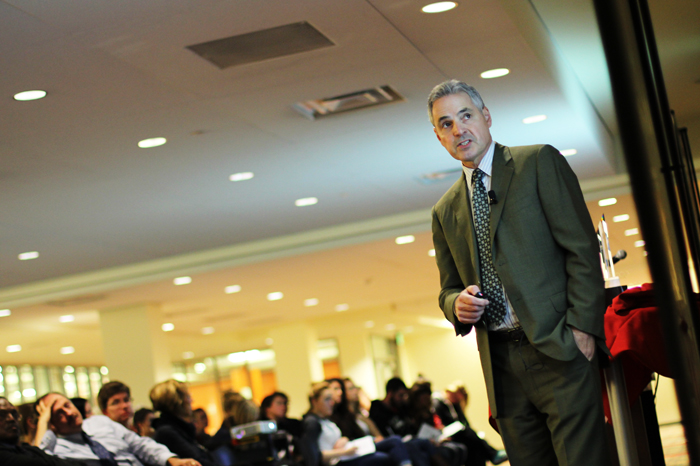Advancing equality
Robert J. Sampson discusses neighborhood inequality in his hometown of Chicaco during a lecture in the CUB Junior Ballroom, Thursday, Oct. 17.
October 18, 2013
One of the nation’s top scholars in sociology, Robert J. Sampson, received the WSU William Julius Wilson Award for the Advancement of Social Justice on Thursday night in the CUB Junior Ballroom.
Sampson, a Henry Ford II professor of the social sciences at Harvard University, was granted with the award for his research in social inequalities.
“It’s an honor to receive the award. I’m humbled by it,” Sampson said. “Especially because it’s in the name of one of my intellectual heroes and friends.”
The award recognizes individuals who promote social inclusiveness as well as diversity, social policy and the reduction of joblessness, said Daniel Bernardo, WSU interim provost and executive vice president.
The award is named after William Julius Wilson, a renowned sociologist and current Lewis P. and Linda L. Geyser University professor at Harvard.
Wilson received his doctorate in sociology from WSU in 1966.
“Dr. Wilson is truly one of WSU’s greatest products,” Bernardo said.
After receiving the award, Sampson gave a brief lecture on his recently published book, “The Great American City,” and then continued into a discussion on modern social inequalities in cities.
Sampson touched on inequality among different races, economic situations and areas of crime, focusing on the change that is taking place.
“Inequality is unappreciated and taking new forms,” he said. “We’re losing a lot of lower and middle class neighborhoods that we used to see.”
Senior fashion merchandising major Kaila Manthei said she was taken aback by some Sampson’s research of inequality in neighborhoods and the growing poverty in suburbs.
“I thought it was surprising that there is poverty on the outskirts of the city because I think of there being more money in the suburbs,” Manthei said.
Sampson said he wanted the audience to understand that while the way cities and neighborhoods experience inequality is changing, much of the process is also staying the same.
“Space is one of the biggest mechanisms of how inequality is dispersed,” he said. “Neighborhoods are always changing, but the relative position of neighborhood poverty stays pretty much the same.”









